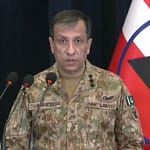
KP govt must protect its people instead of begging Afghanistan for security: DG ISPR
October 10, 2025
Blast at Tennessee explosives plant leaves multiple dead, others missing
October 10, 2025Amid rising speculations over an explosion reported in the Afghan capital a day earlier, the interim Taliban government on Friday accused Pakistan of “violating Kabul’s sovereign territory”.
“Pakistan violated Afghanistan’s airspace, bombing a civilian market in the Marghi area of Paktika near the Durand Line and also violating Kabul’s sovereign territory,” the Afghan Defence Ministry said in a post on social media.
For its part, Pakistan remained tight-lipped on the issue, with the the military spokesperson neither confirming nor denying the strikes when questioned about them at a press conference earlier in the day. The Foreign Office, meanwhile, did not respond to a request for comment till the publication of this report.
On Thursday evening, residents in the border town of Marghi reported that a market selling second-hand weapons had been bombed. Around the same time, Afghan government spokesman Afghan Taliban spokesperson Zabeehullah Mujahid confirmed on X that an explosion “was heard in the city of Kabul”.
Many social media accounts speculated that TTP chief Noor Wali Mehsud was targeted, but Mujahid refuted the reports in an interview with Anadolu Agency and claimed Mehsud was not present in Kabul or Afghanistan.
The development comes amid Afghan Foreign Minister Amir Khan Muttaqi’s first visit to India. During the visit, New Delhi announced it was upgrading its mission in Kabul to a full embassy.
The top Afghan diplomat addressed the Kabul incident while speaking at a press conference, saying: “There has been an attack near the border in remote areas. We consider this act of Pakistan wrong. Problems cannot be solved like this … We have kept the door to discussion open. They should solve their problem on their own.
Earlier, Inter-Services Public Relations Director General Lt Gen Ahmed Sharif Chaudhry did not directly respond when questioned whether Pakistan was responsible for the attacks. “To safeguard Pakistani lives and properties, what measures need to be taken will be taken,” he told reporters.
Surge in terrorism
Terrorism has surged in Pakistan since the withdrawal of US-led troops from Afghanistan in 2021 and the return of the Taliban government.
The banned Tehreek-i-Taliban Pakistani Taliban (TTP), a separate but linked group to the Afghan Taliban, along with its affiliates, is behind most of the violence — largely directed at security forces.
A lieutenant colonel and a major were among 11 security personnel martyred in an exchange of fire with the TTP in the Orakzai district earlier this week.
The federal government and the army have repeatedly accused Kabul’s authorities of harbouring terrorist groups that launch attacks on Pakistani soil with impunity.
Earlier this year, a UN report said the TTP “receive substantial logistical and operational support from the de facto authorities”, referring to the Taliban government in Kabul.
A day earlier, Defence Minister Khawaja Asif told the National Assembly that several efforts to convince the Afghan Taliban to stop backing the TTP had failed.
“We will not tolerate this any longer,” Asif said. “United, we must respond to those facilitating them — whether the hideouts are on our soil or Afghan soil.”
He warned that any response could cause collateral damage. “Everyone will have to bear the consequences, including those providing the hideouts. Enough is enough,” he added. “The Pakistani government and army’s patience has run out.“
Prime Minister Shehbaz Sharif had also said the nation was united in its resolve to eradicate terrorism from the country and the government would take all measures to crush violence perpetrated from across the border.
Pak-Afghan tensions
The issue of terrorists using Afghan soil against Pakistan, along with frequent border skirmishes, has long strained ties between the two countries, with Islamabad repeatedly urging the interim Afghan government to stop allowing its territory to be used for attacks.
With ties between the two neighbouring countries already strained, PM Shehbaz had issued a stern message to Kabul last month, saying Afghanistan must decide whether it stands with Pakistan or the TTP.
The prime minister said terrorists entered Pakistan from Afghanistan and, together with the outlawed TTP, carried out attacks that martyred soldiers, brothers, sisters and ordinary citizens. He added that Pakistan was willing to maintain relations with Afghanistan, but if Kabul chose to side with and support the terrorists, then Pakistan had nothing to do with the interim Afghan government and the terrorists would be eliminated at any cost.
Differences between Pakistan and Afghanistan are primarily centred on security and border disputes. Pakistan has made terrorism its central concern in ties with Kabul, citing a sharp rise in attacks by the banned TTP and other militant groups operating from Afghanistan.
Further exacerbating tensions has been the issue of repatriation of Afghan refugees by the federal government, a move that has been criticised by the Taliban authorities.
During a meeting in January held in Peshawar, political leaders had urged Field Marshal Asim Munir that the military engage with Afghanistan to address Pakistan’s internal security problems. The army chief, however, said the Afghan interim rulers had failed to heed repeated warnings in the past. “They don’t listen to us,” sources quoted the field marshal as telling politicians who had called for formal or informal dialogue with the interim Afghan government.
Lack of action by Afghan authorities against terror outfits has also led to reprisal by Pakistan in recent months.
At least three people were killed and seven wounded in two separate incidents in Afghanistan’s Nangarhar and Khost provinces in August. Afghan authorities claimed the fatalities were caused by strikes carried out by Pakistan. There was no official word from Islamabad, and Afghan authorities did not provide any evidence of Pakistan’s involvement in the incidents.
Pakistan has targeted terrorist camps in Afghan territory in the past: most recently in December last year, when Pakistani jets bombed positions in Paktika province, targeting TTP members.
At the time, the Foreign Office had avoided directly commenting on the claim, but admitted that Pakistani forces conducted “operations in border areas to protect the people of Pakistan from terrorist groups”. A number of cross-border infiltration bids have also been foiled.



